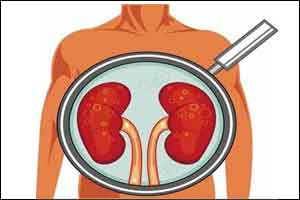- Home
- Editorial
- News
- Practice Guidelines
- Anesthesiology Guidelines
- Cancer Guidelines
- Cardiac Sciences Guidelines
- Critical Care Guidelines
- Dentistry Guidelines
- Dermatology Guidelines
- Diabetes and Endo Guidelines
- Diagnostics Guidelines
- ENT Guidelines
- Featured Practice Guidelines
- Gastroenterology Guidelines
- Geriatrics Guidelines
- Medicine Guidelines
- Nephrology Guidelines
- Neurosciences Guidelines
- Obs and Gynae Guidelines
- Ophthalmology Guidelines
- Orthopaedics Guidelines
- Paediatrics Guidelines
- Psychiatry Guidelines
- Pulmonology Guidelines
- Radiology Guidelines
- Surgery Guidelines
- Urology Guidelines
New oral anticoagulant drugs associated with lower kidney risks

Mayo Clinic researchers have shown a link between which type of oral anticoagulant (blood-thinning medication) a patient takes to prevent a stroke and increased risks of kidney function decline or failure.
Their study, published online today in the Journal of the American College of Cardiology, is the most recent in a series of studies seeking to determine the safety and efficacy of non-vitamin K antagonist oral anticoagulants versus the long-standard warfarin. Patients with atrial fibrillation - a potent risk factor for stroke -- commonly take these medications.
"Kidney function decline in patients taking oral anticoagulant drugs is an important topic that has been overlooked in previous clinical trials," says lead author Xiaoxi Yao, Ph.D. "Even our past work at Mayo Clinic has been primarily focused on risks for stroke or bleeding."
However, she and the study senior author, Peter Noseworthy, M.D., a Mayo Clinic cardiologist, along with the rest of their team, felt that the issue was worth pursuing.
Study findings
"Our study demonstrated that renal function decline is very common among atrial fibrillation patients on blood thinners," says Dr. Yao. "About 1 in 4 patients had significantly reduced kidney function within two years of being on any of these medications, and 1 in 7 patients had acute kidney injury."
The reduced kidney function could lead to kidney failure, dialysis and potentially death. Finding this, the researchers went a step further, trying to determine if the type of medication made a difference.
"In general, patients with atrial fibrillation taking blood-thinning medications tend to have declining kidney function over time," says Dr. Noseworthy. "However, our findings indicate that the non-vitamin K antagonist oral anticoagulants as a group are associated with less injury to kidneys than warfarin."
To come to these conclusions, the researchers studied the de-identified records of 9,769 patients from the OptumLabs Data Warehouse. These patients had atrial fibrillation and started taking oral anticoagulants -- apixaban, dabigatran, rivaroxaban or warfarin -- sometime between Oct. 1, 2010, and April 30, 2016.
The team looked at four indicators of kidney function:
- 30 percent decline (or more) in glomerular filtration rate (how well the kidneys filter waste)
- Doubled serum creatinine level (a waste product that should be filtered by the kidneys)
- Acute kidney injury
- Kidney failure
They found that the cumulative risk of one of these four events occurring within two years of beginning the medication was 24.4 percent, 4 percent, 14.8 percent and 1.7 percent, respectively, proving that kidney function decline is common in these patients.
However, the researchers took it a step further and separated out the patients taking non-vitamin K antagonist oral anticoagulants from those taking warfarin.
"We found that non-vitamin K antagonist oral anticoagulants, as a group, were associated with reduced risk of adverse kidney outcomes," says Dr. Noseworthy.
Why does this matter?
"Patients with atrial fibrillation already face a high risk of kidney disease, perhaps because many such patients have risk factors, such as advanced age, diabetes and hypertension," says Dr. Yao. "Many drugs these patients are taking rely on kidney function for drug elimination. Therefore, it is particularly important for these patients to choose a drug that minimizes the impact on kidneys. Since non-vitamin K antagonist oral anticoagulants have a different drug mechanism than warfarin, researchers have hypothesized that non-vitamin K antagonist oral anticoagulants may be related to better renal outcomes. Our study is among the first few studies confirming this hypothesis."
Their findings have important implications for medical practice, she says, and Dr. Noseworthy confirms.
"Just as I do with my own patients, I encourage conversations on these risks and benefits between patients and their providers," says Dr. Noseworthy.
"Each patient's situation is different, so each medication decision must be made based on the individual's lifestyle and diet, other illnesses and medications, out-of-pocket costs, and so forth."
Both he and Dr. Yao encourage health care providers to regularly follow up and monitor kidney function in their patients taking anticoagulants. They urge providers to make efforts to prevent or slow kidney function decline, as well as adjust drug dosage based on the change of kidney function. And, as with all medications, Dr. Noseworthy cautions patients to never stop or change any medication dosage without consulting with their health care providers.

Disclaimer: This site is primarily intended for healthcare professionals. Any content/information on this website does not replace the advice of medical and/or health professionals and should not be construed as medical/diagnostic advice/endorsement or prescription. Use of this site is subject to our terms of use, privacy policy, advertisement policy. © 2020 Minerva Medical Treatment Pvt Ltd